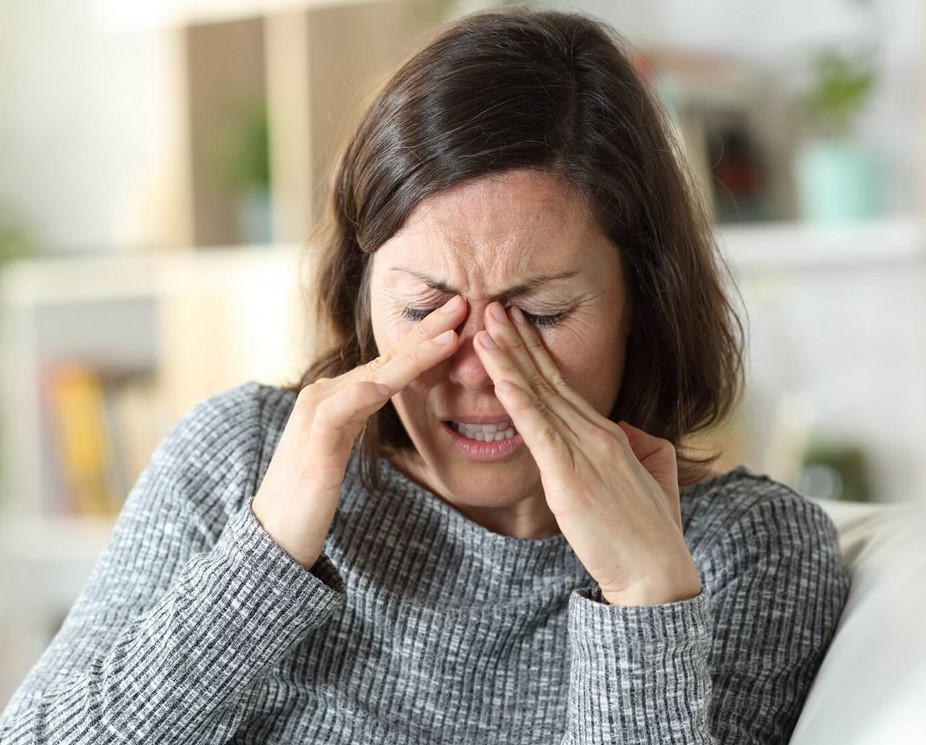
How does menopause cause dry eyes?
As you age, tear production decreases, no matter your sex. However, the prevalence of dry eyes in postmenopausal women is higher than in men the same age. It is thought the link between menopause and dry eyes is due to the decrease in production of reproductive hormones like androgen and oestrogen, although research to support this is limited.
Your tears are made up of a mixture of oils, water and lipids. During menopause, women naturally begin to produce less reproductive hormones, such as oestrogen and androgen. Some researchers believe when you produce less androgen, this can affect the glands in your eyelids which produce the essential oils in tears. The reduction of the oil in tears is thought to make the tears evaporate quicker, causing your eyes to become dryer and inflamed.
Decreased oestrogen levels has also been linked to dry eyes, although there is limited evidence to support this. It’s thought this is why some women experience dry eyes during their monthly cycle or when taking birth control medication.
Dry eyes symptoms
There are many symptoms of dry eye syndrome. It can cause your eyes to feel sore, burning and itchy. It can also cause them to be red and watery. In severe cases, you may experience temporary blurred vision and an increased sensitivity to light. You may also find your contact lenses feel more uncomfortable than usual.
Treating dry eyes
As well as menopause, there are many other causes of dry eyes.
Spending too much time on digital devices can cause your eyes to become dry, as you tend to blink less often than you should when you look at screens. Wearing contact lenses for too long can also cause your eyes to become dry, as can environmental causes such as dust, dry air and air-conditioning.
There are a few ways you can treat dry eyes. If you’re experiencing any symptoms of dry eyes, due to menopause or other causes, limiting your exposure to digital devices and taking out your contact lenses can help to relieve these symptoms. Staying indoors during dry weather and maintaining a clean home can also reduce your eyes’ exposure to harmful elements.
Lubricating eye drops are also useful for hydrating and treating dry eyes. Shop our range of eyecare products.
Menopause symptoms
As well as your eyes, menopause can affect women in other ways physically, as well as mentally. The first sign of menopause is usually a change in the frequency of your periods, until you stop having them altogether.
Most women experience additional symptoms to this. Some of these include:
- Hot flushes
- Night sweats
- Reduced libido
- Mood changes
- Joint stiffness and pain
Other ways menopause can affect your eyes
Dry eye syndrome is one of the most common ways menopause affects eye health. Luckily, it isn’t a serious condition. There are, however, more severe eye conditions that can be caused due to menopause.
As you get older, your eyes begin to deteriorate. Because of this, it can be difficult to distinguish whether an eye condition is caused by menopause or ageing.
Other eye conditions which menopause are thought to cause include:
Maintaining regular eye tests
Menopause can cause many physical changes in your body, including your eyesight. Having regular eye tests helps your optician detect potential issues due to menopause or ageing early, some of which are more serious than dry eyes. This makes it easier to treat the condition and prevent symptoms from worsening.
We’ve teamed up with Radio DJ Jo Whiley for National Eye Health Week, to raise awareness around the effects menopause can have on eye health. If you’re worried about how healthy your eyes are, whether this is due to ageing or menopause, you can talk to us in store. We can give you an eye test and help you keep your eyes healthy.


